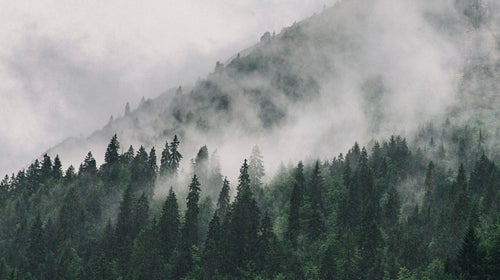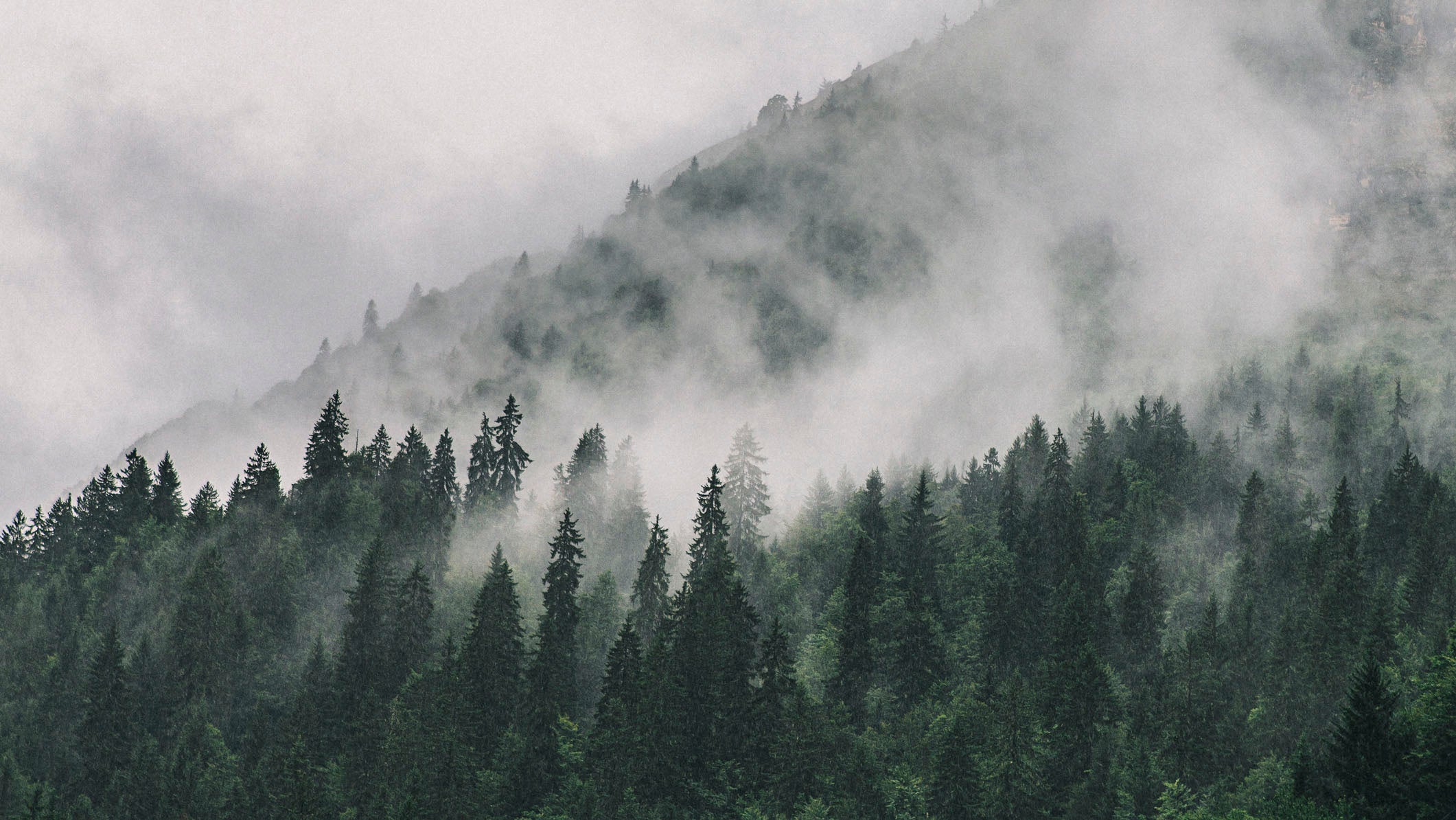Christopher Lewis looked at his phone. It was 10 P.M., and he was soaked, frigid, and fighting intense pain.
The adrenaline from his fall had long worn off, and his body was aching all over. He envisioned the people who might be searching for him, and then thoughts of despair filled his mind: What if they don’t find me? At what point will the people searching consider themselves at risk and turn back?
The rain brought waves of feelings, knocking his once positive attitude to the depths of hopelessness. Lewis sat shivering uncontrollably and thought about his chances of survival. More negative thoughts crept in.
At least they will find my body.
On September 18, 2021, Lewis was hiking along a ridge in northwestern Montana when he glassed his quarry: a buck mule deer bedding down. This was Lewis’s first season bow hunting, and he was excited to see a deer with a good-sized rack of antlers. It was 4 P.M., and a rainstorm that passed earlier in the day had left a thick low-hanging fog that resembled wet, gray cement. Lewis, a licensed school counselor on Montana’s Blackfeet Reservation, knew more rain was coming and that it would get dark soon.
Still, he thought he had time to pack the meat out if he killed the animal. He stalked near it, arrow nocked, his eyes locked on the buck—not where he was walking.
Lewis stepped on a slab and his left leg slid, sending him several feet downhill before his right ankle anchored in a rock crack. His body continued sliding, and he heard three distinct pops as a lightning bolt of pain shot up his leg.
“It was the most excruciating pain I could ever imagine,” Lewis said.
He screamed and the buck bolted. Looking down at where the toes of his right foot should have been, Lewis instead saw his heel. His foot pointed grotesquely sideways.
Lewis was a backcountry veteran—he knew right away that the situation was serious. His first thought was: I’m going to die.
Lewis pulled out his phone. Zero reception. He wasn’t surprised, he knew navigating dead zones was part of life in northwestern Montana. But he’d downloaded an offline topo map to his OnX Hunt app. Lewis looked at the app and saw he was five miles from his car and a two-hour drive from the nearest town.
The app also showed a nearby clear-cut area with a service road on its edge, which he guessed would be the most likely spot for a rescue by helicopter. But that clearing was a mile away and 1,200 feet down steep terrain.
Had the slope been mellower, Lewis could have hopped on one leg, but the route traveled through standing timber, around downed trees, across rocky clefts, and through small subalpine finger meadows.
“This wasn’t a big towering piece of Glacier National Park, and so 1,200 feet would normally be no problem,” he said. “But descending with my ankle rotated in the wrong direction was a whole other level of difficulty.”
The temperature was dropping by the minute. Lewis realized he’d made two major mistakes. He left the fire-starter kit that he normally took backcountry skiing in the car, and he wasn’t carrying a SPOT satellite device. He felt himself sinking toward despair.
Death is not an option, he thought. He repeated the mantra. It galvanized him. He grabbed a stick to bite down on and attempted to set his own ankle by yanking it into place. Waves of pain and nausea flooded him as his vision darkened. After the agony subsided, he thought, Now I can walk.
He stood on his left leg, then gradually put a tiny amount of weight on the broken foot. The ankle collapsed sideways, and as another shock wave of pain rocketed up his body, he found himself resting on his leg four inches above the foot.
Lewis set small achievable goals as he began belly crawling.
Get over that rock fin.
Crawl across this meadow.
Toss your body over that downed fir.
I can do this, he thought. Death is not an option. He rewarded each accomplishment with drinks of water and marked his locations on the OnX app. In an hour he crossed 300 yards and reached the beginning of the thicker timber, even though the journey only took him down 200 or so vertical feet.
In his shock, Lewis had forgotten to build any kind of splint. He sat down, pulled out his Therm-a-Rest, and strapped it to his leg. He attached his bow to his pack and removed one trekking pole so he’d have an arm free to help maneuver up, over, and around any downfall. No longer hopping, Lewis now belly-crawled under downed logs, hoisted his leg up and over others, and butt-scooted when necessary.
He pulled out his phone to check his progress on the map. After another hour and a half, he’d only gone 300 feet.
“My heart sank. I needed a miracle,” Lewis recalled. He turned his phone off airplane mode and discovered one single bar of service.
Ecstatic, Lewis called two close friends, Colin Sibbernsen and Charlie Speicher, both of whom are highly adept in the outdoors. Lewis told Sibbernsen his location and the coordinates of the clear-cut. Sibbernsen phoned and texted a network of friends to initiate search and rescue (SAR) attempts. Meanwhile, Speicher calmly encouraged Lewis down the mountain on the phone. “You got this, bro,” he told Lewis. “I’ll come get you.”
Lewis’s service disappeared. But the call gave him hope, even as his sweat dried and his core temperature dropped. Drizzle began to fall from the thick low clouds, and he was soon drenched. He had a down puffy, extra clothes, and an emergency space blanket in his pack, but he didn’t want to put the extra layers on yet; he knew he would stay warm if he kept moving.
Pooling darkness spread from tree wells as night approached. Lewis continued his arduous journey. He descended five feet, then traversed ten feet to get around downed trees.
“We all do a lot of bushwhacking when it comes to mountaineering and ski touring in northwestern Montana,” Lewis said. “But this brought a whole new definition of it for me. It was just another world of hard.”
As the sky turned pitch-black, he pulled out his headlamp. The beam only reached five feet, so it was basically useless. Lewis felt his way down the mountain through the dark. Seven hundred feet to go.
More than 40 miles away, in Whitefish, a helicopter with Two Bear Air Rescue, a million-dollar SAR enterprise, took off. The crew had night vision and heat-seeking capabilities to spot warm bodies in thousands of square miles of wilderness.
Lewis continued floundering amid the dark timber. He wondered why he couldn’t be like other people who stayed home to watch college football. Adrenaline flowed with each step, and he often forgot about his broken leg, only to be reminded with a bump or a snag.
Finally, he reached the clear-cut.
“I began screaming, and not in pain, but I was so excited that I made it downhill through the timber,” he said. “I was so proud of myself.”
However, Lewis wasn’t out of the woods just yet. The area was full of downed trees, debris, and stumps, barricading the last 200 yards to the service road where a helicopter could possibly pick him up. He pulled out his other trekking pole and continued hopping on one leg through the rough terrain. Cramps surged up his good leg.
The clouds that had threatened all afternoon opened up. After 100 yards, Lewis sat down in exhaustion and laughed at the storm as the sky dumped freezing rain on him. He wondered if the crews would find him.
Miles away, the rain interrupted the lifesaving operation, and Two Bear Air was forced to land in a field to wait out the downpour.
“In a weird way, I was at peace,” Lewis said. “I fought for six hours, but I was done. I was really proud of myself.”
Seated in the rain, Lewis heard the voice of his best friend Kyle, who had died in April 2019 of brain cancer.
“You gotta get up! Get up! Get the fuck up!”
Lewis leaned on his poles and stood.
“I can’t control that I broke my leg,” he said. “I can’t control the rain. But I can control how I react. I can either move or sit here and die.”
Lewis still needed to get 100 yards across the clearing. Suddenly, he heard the whirling of helicopter blades. Then the sound disappeared. No way! he thought. Am I hearing things?
Fifteen minutes later the noise returned, with a thwap-thwap-thwap. Lewis glanced up at the lights of the chopper flying over the face where he’d just come from. He attached his headlamp to his ski pole, waved it in the air, and yelled.
The SAR team circled, then hovered 100 feet above Lewis and lowered chief rescue specialist Wil Milam, who was harnessed to a hoist with a sling load. He asked Lewis several orientation questions about where he came from, what he was doing, and whether he had any internal bleeding. Milam secured and loaded Lewis in the sling, then he harnessed Lewis to him as another SAR official reeled them both in. They flew Lewis to Glacier International Airport, where an ambulance took him to an emergency room.
Three months after the rescue, Lewis is using crutches to walk through his East Glacier home. Two metal plates and eight screws hold his ankle together. He’s determined to get back to the wilderness, even if his return date isn’t settled.
“It was a pretty emotional experience,” Lewis said. “I was very grateful. If I didn’t manage to get that bar of service and talk to my friends, I don’t know if there would’ve been a narrative.”


